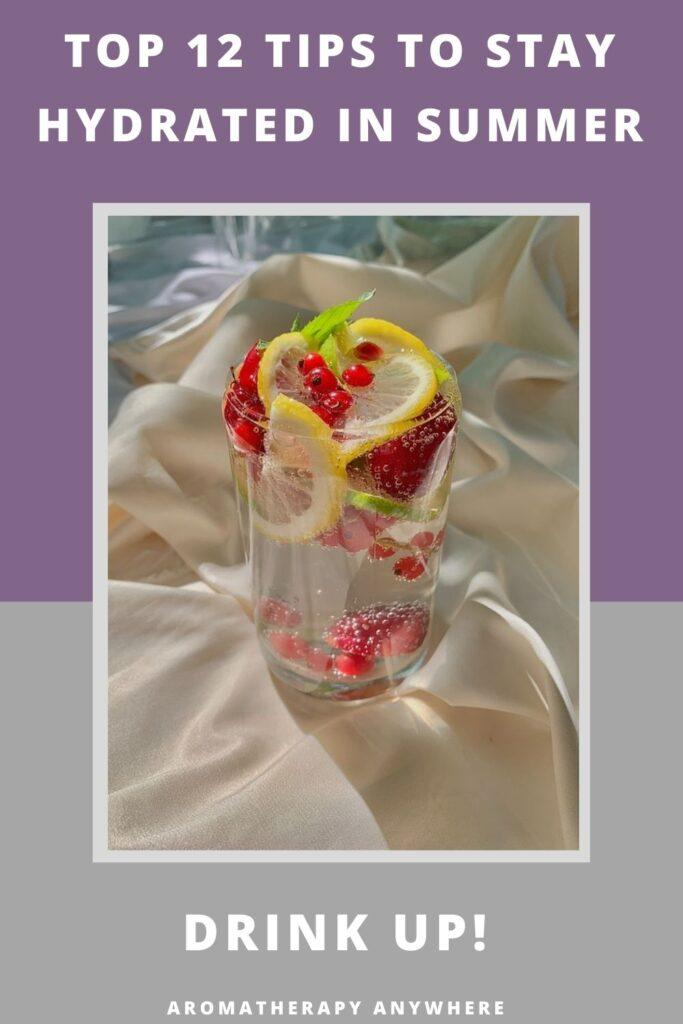As an Amazon Associate I earn from qualifying purchases. See Full Disclosure Here
Staying hydrated is an essential part of our everyday health. ‘Drink enough water’ should top the list of any healthy lifestyle checklist. And yet, it rarely is.
When we talk about maintaining a healthy lifestyle, we add diet and exercise to the list. But more often than not, we completely ignore the importance of water and hydration.
But that’s not some new discovery. We all know the importance of staying hydrated. Where we fail is actually staying hydrated. Here’s why that’s a big mistake and what you can do to stay hydrated and healthy.
Importance of hydration for health
About 60% of our body weight is composed of water. Our heart and brain are nearly 75% water and our lungs are close to 85% water. Water plays an important role in keeping all these organs healthy and functioning optimally.
Water is responsible for a variety of bodily functions. From producing saliva and sweat to helping us eliminate waste, nearly every system in our bodies relies on water in one way or another.
There’s no doubt that water is not just essential but is an integral part of our everyday health.
- Improves brain function
- Keeps headaches at bay
- Boosts energy
- Improves metabolism, which helps burn energy more efficiently
- Helps curb appetite and avoid over-eating
- Boosts weight loss through curbing appetite and boosting metabolism
- Improves digestion by improving absorption of nutrients and elimination of waste
- Promotes better health by preventing common medical problems such as hypertension, kidney stones, constipation, and more
- Aids blood circulation, which keeps organs and tissues healthy and functioning properly
- Prevents muscle soreness and joint pain
- Regulates mood
- Boosts collagen production which keeps skin looking soft and supple
- Keeps your skin hydrated and reduces the risk of severe sunburn
How Much Water Do You Need To Drink Every Day To Stay Hydrated?
 According to this research published on PubMed, the recommended total daily fluid intake for men is 3,000 ml (4.20 ounces) and 2,200 ml (3 ounces) for women. The article goes on to say that drinking more than that does not have any convincing health benefits, except perhaps in preventing recurring kidney stones.
According to this research published on PubMed, the recommended total daily fluid intake for men is 3,000 ml (4.20 ounces) and 2,200 ml (3 ounces) for women. The article goes on to say that drinking more than that does not have any convincing health benefits, except perhaps in preventing recurring kidney stones.
That may seem like a lot, but it’s actually easily manageable. The research focuses on ‘fluid intake’, which means it can come from a variety of sources. You’re not limited to drinking water to say hydrated although, to be honest, is the easiest way to stay hydrated though.
There are also many foods that have high water content which can help you reach your target for the day. Simple things like eating a diet high in fruits and vegetables with high water content can increase your daily water intake.
Drinking water and consuming healthy foods with high water content will help ensure your body stays hydrated and operates at its peak.
12 Top Tips for Drinking More Water
 Drinking water can feel like a chore when you aren’t used to it. Knowing your body needs so much water each day to stay healthy can feel overwhelming if you’re used to consuming other beverages. Most people don’t want to give up their favorite drinks in exchange for water. It helps when you take it slow and switch things up to increase your water intake.
Drinking water can feel like a chore when you aren’t used to it. Knowing your body needs so much water each day to stay healthy can feel overwhelming if you’re used to consuming other beverages. Most people don’t want to give up their favorite drinks in exchange for water. It helps when you take it slow and switch things up to increase your water intake.
These tips and tricks for consuming more water will make it easier for you to stay hydrated. Introduce these gradually into your daily routine and soon you’ll be consuming the recommended amount of water you need with ease.
1. Create a routine
This is the easiest way to drink more water and stay hydrated any time of the year.
Many of us don’t drink enough water throughout the day simply because we forget about it. It’s not on our to-do list for the day. It’s not on our lifestyle changes list. It’s just not something we give a second thought to.
Creating a routine can help change those dynamics and help you commit to drinking more water. Like any other routine, in time it becomes second nature and you’re less likely to forget.
Start by having a glass of water each morning before your coffee or morning meal. Make it a point to have at least half a glass of water every one hour or so.
2. Carry a Smart Water Bottle With You
We often drink far less water than we should. Either we forget to drink up or we think we’ve consumed enough fluids.
Using a smart water bottle takes away the guesswork. These bottles are designed to track the amount of water you drink every day. Some have labels with markings that include the time and the amount of water to drink.
Others may have an LED light that glows when it’s time for you to drink up.
Simply fill and go and you have all the water you need for an entire day in one easy-to-carry bottle.
Amazon offers water-tracker bottles in a variety of styles to suit every lifestyle, personal preference, and budget. These are some of the more popular smart water bottles, some of which have over 24,000 user reviews.
You don’t have to buy a special bottle of course. You can just keep a regular bottle of water on your dining table. Keep another in your home office or study table and another at your bedside. They serve as constant reminders of your commitment to staying hydrated.
Sipping water throughout the day can help you reach your goals. Before you know it, you’ll have reached your water needs without much effort.
3. Eat your water
I know – that sounds so cheesy but my nutritionist said it to me and I found it so amusing I couldn’t resist!
Loading up on fruits and vegetables with high water content counts towards your water consumption for the day. Cucumber, celery, watermelon, grapefruit, grapes tomatoes, strawberries, and spinach, are all great choices. They contain as much as 90% water and are all easily available in summer.
In addition to high water content, these fruits and veggies are also rich in micronutrients that are essential to health. The best part? They are all low in calories in sugar.
Including these fruits and veggies with your meals helps you stay hydrated and nourished without worrying about your sugar consumption or weight gain.
4. Use a water-tracking app or journal
There are digital apps as well as paper trackers that help you drink more water and stay hydrated.
Digital apps such Hydro Coach, WaterMinder, and Aqualert help you get the right amount of water throughout the day. The apps include gentle reminders and helpful tips that ensure you’re drinking enough water and staying hydrated.
You can also use any of these habit tracker journals to track how much water you’re drinking every day.
5. Drink water ½ an hour before and after every meal
Adding an 8-oz glass of water to each meal will help you consume 24 ounces of water without giving it a second thought.
Drinking water before your meals also helps you feel more satiated so you eat smaller quantities. And drinking water after meals helps you digest your food properly.
The important thing is to keep a ½ hour gap between drinking water and your meals. When you eat, digestive juices get generated, which help with digestion. Drinking water too close to mealtime dilutes these gastric juices and hinders proper digestion.
That ½ hour gap before and after meals can make the difference between proper and faulty digestion.
6. Make Things Exciting With Infused Water
Not too fond of plain water? Sprucing up your water with a few delicious, low-calorie ingredients can make a world of a difference. They transform an ordinary glass of aqua into a delicious, healthy, and refreshing drink.
Add citrus slices, berries, mint, pomegranate, or cucumber slices to a large pitcher of water and leave it for a while. You can use a regular glass pitcher or this type of specially designed Fruit Infusion Flavor Pitcher.
Keep it in the refrigerator if you prefer cold water or on the table if you like room-temperature water.
For single servings, use a fruit infusion water bottle.
You can either add slices of any one fruit or a combination of fruits and herbs. The water gets infused with the flavors of whatever fruit and herbs you’ve added to it. It’s the easiest, healthiest, and tastiest way to stay hydrated without adding sugar or other unhealthy additions.
Want to experiment with different flavors of infused water? This book Infused Water: 75 Simple and Delicious Recipes to Keep You and Your Family Healthy and Happy includes interesting flavor combinations that are both delicious and incredibly easy!
7. Cut Out Dehydrating Foods And Beverages
Not all fluids keep you hydrated. Some actually work against it. For example, alcohol and soda both zap water from your system leaving feeling dehydrated. Beverages such as energy drinks, coffee, sugary drinks, and even flavored milk are all just as bad. They are loaded with sugar, sodium, and other flavoring agents and preservatives that draw out water from your tissues. Swap these beverages out for more hydration-friendly fluids.
High-salt foods, dried fruits, and over-processed foods also drain water from your system and rob your body of hydration. Cutting back on or better still completely eliminating these foods can help you stay hydrated.
8. Replenish When You Perspire
You lose a lot of water through perspiration in summer. More so if you work out. You need to be especially careful about staying properly hydrated after any type of physical exercise. The American Council on Exercise has put certain guidelines in place for staying hydrated before, during, and after a workout.
They recommend drinking:
17-20 oz. 2 to 3 hours before working out
8 oz. 20 – 30 minutes before working out
7-10 oz. every 10 to 20 minutes while working out
8 oz. no more than 30 minutes after working out
9. Keep Your Body Cool To Preserve Loss Of Water
Proper hydration isn’t just about drinking water—it’s about regulating your body temperature, too.
Staying cool in summer helps to prevent excessive loss of water from your body so you don’t get dehydrated. There are lots of little things you can do to help.
Wear light, loose-fitting clothes in cotton fabrics and light colors. The cotton fabric allows your skin to breathe and the loose fit helps to trap the cool air.
Wear a wide-brimmed hat to protect yourself from excessive direct exposure to the sun.
Schedule strenuous sports and physical activities during cooler times of the day – early morning or late evening. Take drink breaks often while working out and mist yourself with a spray bottle if you become overheated.
10. Drink Fresh Coconut Water
We’re talking about fresh coconut water straight from the fruit, not packaged drinks.
Coconut water is rich in a wide range of minerals including magnesium, sodium, potassium, and calcium. Drinking fresh coconut water replaces the fluids and electrolytes that you lose through exertion and perspiration in hot, humid weather.
When it comes to staying hydrated, coconut water is a much better option than fruit juices. Fruit juices have more calories than fresh coconut water. And packaged juices have added sugars that do more harm than good.
If you can’t find the natural variety, packaged coconut water is the next best alternative. Look for reputed brands that do not add sugar or other additives to the coconut water.
11. Hydrate Before You Caffeinate
This means drinking a glass of water before reaching out for your morning coffee or any other type of caffeine drink.
Most of us wake up dehydrated. The 7 to 8 hours that you’ve been asleep is a long time to go without drinking water. When we wake up, the first thing we do is reach out for a cup of coffee. The problem with this is two-fold.
First of all, the reason we wake up feeling groggy is not that we need a boost of caffeine, but because we are dehydrated. The fastest way to hydrate first thing in the morning isn’t with coffee, but plain old water.
Secondly, coffee is a diuretic. It increases urination, which eliminates water from the water leaving your even more dehydrated than before.
Drinking a full glass of water before your coffee can fill you up and reduce the amount of coffee you end up drinking. You’ll feel like you don’t have any more space for more than one cup of coffee. Besides, you’ve already got your energy boost from the water so you don’t need the coffee anyway.
12. Flying Somewhere? Choose Water In-Flight
Airports and flights can be very dehydrating. The air inside airplanes has very low humidity air, which contributes to low hydration at touchdown. If you’re traveling across time zones you’ll find that jet lag hits you really hard when you’re dehydrated.
Most airlines don’t allow passengers to carry beverages in their carry-on baggage. But there are ways around this. Pack an empty reusable water bottle with you in your carry-on bag and then fill it up with water after going through security.
During the flight, resist the temptation to have a soda or a drink and ask for water instead when the beverage cart comes around.
There are lots of ways to consume water without feeling overwhelmed. Consider any of these tips and you’ll see an improvement in the frequency and consistency you have getting enough proper hydration day in and day out.
Too Much Water Diluting Your Summer Fun? Here are a few solutions
Before diving into the tips for drinking more water, I have to mention something rather interesting and unexpected that happened after I published this article. I received a ton of feedback and comments saying something along the lines of ‘water…no thank you. I know the importance of staying hydrated but drinking more water is can be a bit of a drag.’
So for all of you who know you need to stay hydrated but don’t relish the idea of gulping down glasses of water throughout the day, I published an article on How To Stay Hydrated Without Drinking Water. This article is packed full of delicious and healthy ways to stay hydrated that don’t involve drinking water. I’d love to hear your thoughts and of course, if you have any other ideas, they’re welcome.
Also, check out these 25 Infused Water Recipes for Delicious, Healthy Hydration. Along with the recipes, you’ll also find detailed instructions on how to make infused recipes with various fruit and herbs.
Take this up a notch by learning more about the benefits of infused water.
Recognize The Symptoms Of Dehydration
Does your skin feel dry, irritated, inflamed, itchy, or sensitive? That’s one of the symptoms of dehydration.
Other symptoms of dehydration include headaches, dizziness, and fatigue.
Muscle cramps, rapid breathing, fainting, and not urinating are symptoms of severe dehydration.
Read my detailed articles on Symptoms of Dehydration in Adults + Dangers, Risk Factors, & Prevention
If you’re experiencing any of these symptoms, the simple solution is to get out of the heat and drink plenty of liquids. There are small over-the-counter options like Pedialyte and Hydralyte that balance out electrolytes and sodium with dehydration as well. If your dehydration is severe, call 911.
Other Summer Wellness articles you may be interested in:
How Often Should You Apply Sunscreen?
Home Remedies for Sunburn Relief: Soothe Skin Fast

Disclaimer: This information is not intended to serve as medical advice. Please consult your doctor before using any natural medication or if you experience any unusual symptoms. See Full Disclaimer here.









